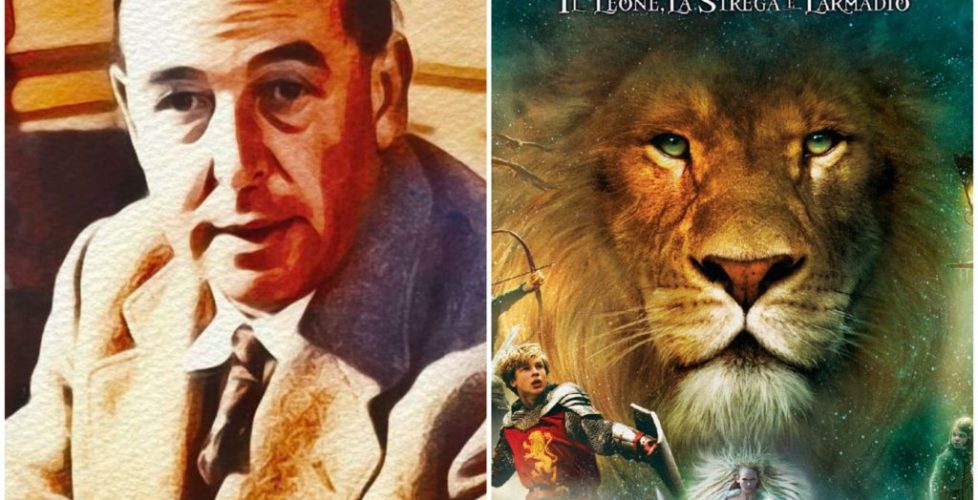Kathryn Tse-Durham: The Giant that was Clive Staples Lewis
My little boy and I have a ritual. We started this around April amidst the surreal and mostly homebound year of Covid-19. Instead of reading him books at bedtime, he wanted me to tell him tall tales that I would make up on the spot. I discovered this is good practice for me as a writer. Every night at dinner, he rattles off a list of characters on his little fingers, characters that I had made up for him off the top of my head. “Mommy, tonight I want a story about James the Giant, Dillon the Dinosaur, Goldilocks, Calvin the Cockroach, and…” He would often pause and try to come up with a new character, perhaps a gargantuan scorpion or snake or other. And I would smile gamely and wrinkle my brow and thank God that He blessed me with some skill for weaving the fantastical. For every bedtime story, my little boy always includes James the Giant, who started off quite villainous, but got rehabilitated into a gentleman by the nosy but good-hearted Goldilocks and her little human friends (one of them named Jonathan, of course).
There is another type of giant that walks among us, one that makes the earth shudder not in the literal sense, but in the figurative sense. There are certain people that we look up to, people that seem bigger than life and inspire us to take that risk, walk that extra mile, put in that extra hour of practice. Clive Staples Lewis, or more commonly known as C.S. Lewis (or “Jack” in his social circle), is a literary giant who is best known for The Chronicles of Narnia and The Screwtape Letters, and dozens of other notable works such as The Four Loves and Mere Christianity. He was known to be one of the most brilliant yet humble intellectuals with a wicked sense of humour. Apparently, he liked to play pranks, and he donated much of his earnings to charities and never told anybody about it. And he was very kind. Even his personal secretary attested to this, and a personal assistant often knows more about their boss than even their own friends or family. This is what made me want to learn more about him. Great writers are usually known for their intellect, but not always known for their kindness and warmth and humanity.
Actually, I am an avid fan of J.R.R. Tolkien, who was a great friend and colleague of C.S. Lewis at Oxford. One day I will write about Tolkien, who was an extraordinary person in his own right. In my younger years, I never got into The Chronicles of Narnia because it just didn’t captivate me like Tolkien’s The Lord of the Rings did, a colossal story that is forever seared into my heart. But I felt compelled to write about Lewis after a recent discussion I had with my husband, during which I learned some very moving things about the man and made me realize something important: before one becomes a good writer, one should strive to be a good human being. This is because writing is an organic process that reflects our world view. If we do not understand people, if we lack compassion, if we do not believe that all humans of all races and skin color and backgrounds should be treated with respect and dignity, it will show in the things we write about. And what good can writers with intent to preach evil do for humanity? Adolf Hitler wrote the Mein Kampf, the autobiographical manifesto which describes the process by which the Nazi Party leader became antisemitic and his plans to destroy Jews and other ‘impure’ peoples and transform Germany into the world’s conquering power. But such works should serve to remind us of the atrocities that we should avoid at all costs, not to inspire us to be more hateful and destructive. C.S. Lewis famously quoted, “Of all tyrannies, a tyranny sincerely exercised for the good of its victims may be the most oppressive. It would be better to live under robber barons than under omnipotent moral busybodies.” The man believed passionately in God and love and all that is good and wholesome, all that grows and nurtures the human spirit. In all that he writes, you can see his beliefs and values shine through, and this is how his writing has given hope and inspiration to many over the decades.
As a writer, I was curious about the advice that C.S. Lewis imparted about writing. I have been reading his masterpiece The Screwtape Letters, a one-of-a-kind story about how the devil trains his apprentice to lure a Christian man from his faith. Though I am only a few chapters in, I am already struck by his unique prose, which is at once sardonic, poetic, and searingly clear. There are times when you come across something in a book and you go, “Yes, I totally get that! I’ve thought about it in vague terms, but never was I able to put it into words like that. How did the writer articulate it so well?” Lewis had a great talent for this, as most great writers do.
In his letters and other sources, C. S. Lewis left various bits of advice on the craft of writing, and I’ve shared some of his words of wisdom here, with bits of my thoughts embedded throughout:
- Avoid distractions. So, turn off the radio and the TV and devote an allotted time to your craft.
- Read all the good books you can. Only by reading good writing can you learn to become an even better writer and broaden your horizons.
- Always write (and read) with the ear, not the eye. Hear every sentence you write as if it was being read aloud or spoken. If it does not sound nice, try again.
- Write about what really interests you, whether it is real things or imaginary things, and nothing else. (Notice this means that if you are interested only in writing you will never be a writer, because you will have nothing to write about . . .)
- Take great pains to be clear. Remember that though you start by knowing what you mean, the reader doesn’t, and a single ill-chosen word may lead him to a total misunderstanding. In a story it is terribly easy just to forget that you have not told the reader something that he needs to know—the whole picture is so clear in your own mind that you forget that it isn’t the same in his.
- Be sure you know the meaning (or meanings) of every word you use.
- Avoid ambiguity. The way for a person to develop a style is to know exactly what he wants to say, and to be sure he is saying exactly that. The reader, we must remember, does not start by knowing what we mean. If our words are ambiguous, our meaning will escape him. I sometimes think that writing is like driving sheep down a road. If there is any gate open to the left or the right the reader will most certainly go into it.
- Always try to use the language so as to make quite clear what you mean and make sure your sentence could not mean anything else. Always prefer the plain direct word to the long, vague one. Don’t implement promises, but keep them. Avoid fancy, unnecessary words. There is nothing worse than reading a piece of pretentious, convoluted writing that makes you want to stop in two minutes.
C.S. Lewis said, “Literature adds to reality, it does not simply describe it. It enriches the necessary competencies that daily life requires and provides; and in this respect, it irrigates the deserts that our lives have already become.” And I agree. Literature in the form of good stories don’t just reflect life; it enriches and adds colour to life that can at times feel unbearably dull, repetitive, and mundane. This is why doctors, bankers, lawyers, and others who slave for hours at the workplace stumble home bleary-eyed and melt onto the couch and wind down with a good dose of Harry Potter or Netflix. We crave stories because they give us renewed hope and rejuvenate our fatigued souls. Loving stories is neither a weakness nor a frivolous thing. It is being wonderfully human. And by all accounts, C.S. Lewis was a wonderful human being, a gentle giant, and that is probably why his writing is achingly beautiful. For my Jonathan, one day I shall name one of our bedtime giants “Jack” and whisk my boy off to the world of Narnia.
Kathryn Tse-Durham
Author of The Ellanor Chronicles
13th August 2020
This blog post is also posted on Kathryn’s Facebook Page. Visit here.

